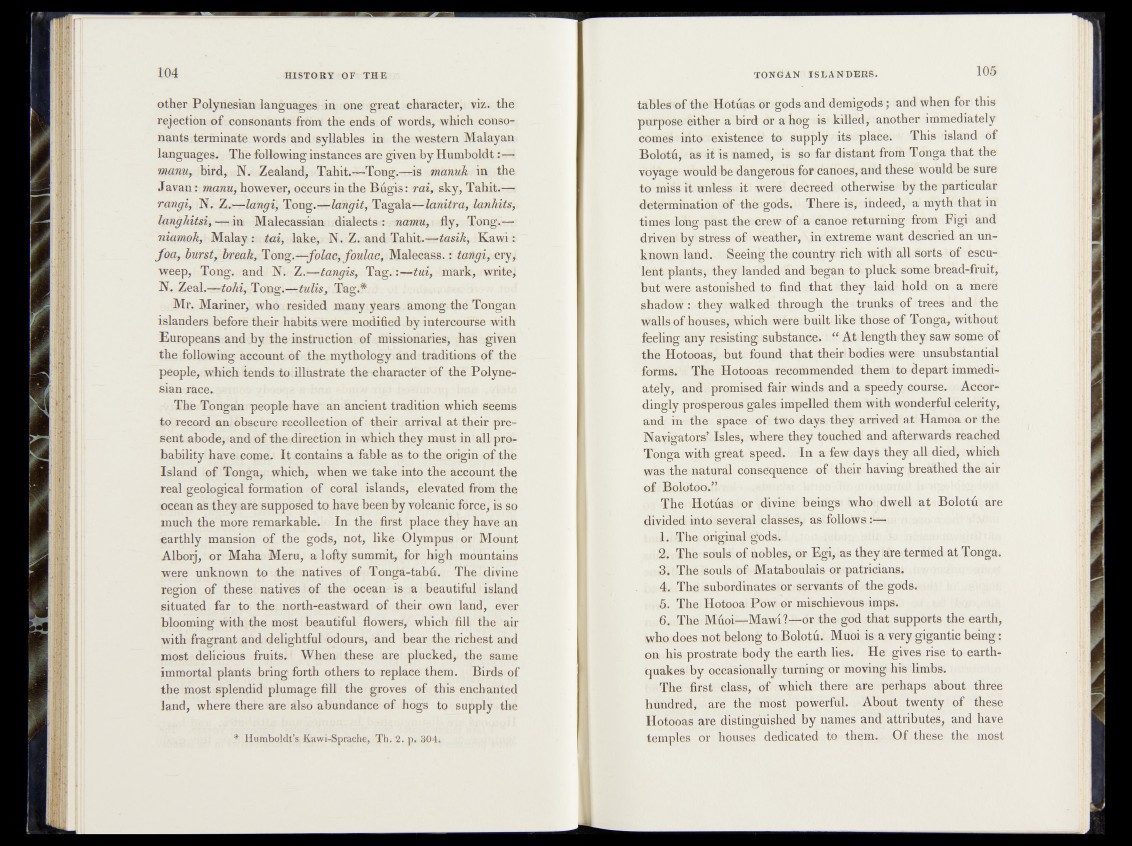
other Polynesian languages in one great character, viz. the
rejection of consonants from the ends of words, which consort
nants terminate words and syllables in the western Malayan
languages. The following instances are given by Humboldt:—
manu, bird, N. Zealand,: Tahit.—Tong.—is manuk in the
Javan; manu, however, occurs in the Bugis: rai, sky, Tahiti—
rangi, N. 2i„—rlangi, Tong.—langit, Tagala—lanitra, lanhits,
langhitsi, hmin Malecassian dialects:. namu, fly, Tong,.—
niamok, Malay: tai, lake, N. Z. and Tahit.—tasiA, Kawi:
fo a , burst, break, Tong.—fo la c ,fa u la c , Malecass.: tangi,ery^
weep, Tong, and N. Z.s—tangis, Tag. :—£*«, mark, writej
N. Zeal.—iohi, TQBg,—rtulis} Tag.* :
Mr. Mariner, who resided many years .among the Tongan
islanders before their habits were modified by intercourse with
Europeans and .by the instruction of missionaries, has given
the following account of the mythology and traditions of the
people, which tends to;illustrate the character of the Polynesian
race.
The Tongan people have an ancient tradition whieh seems
to record am obscure recollection of their , arrival at their present
abode, and of the direction in which they must in all pr<a?-
hability have; come. It contains a fable as to the origin of the
Island of Tonga, which, when we take into the account the
real geological formation of coral islands, elevated from the
ocean as they are supposed to have been by volcanic force, is so
much the more remarkable. In the first place they have an
earthly mansion of the gods, not, like Olympus or Mount
Alboij, or Maha Meru, a lofty summit, for high mountains
were unknown to the natives of Tonga-tabfi. The divine
region of these natives of the ocean is a beautiful island
situated far to the north-eastward of their own land, ever
blooming with the most beautiful flowers, which fill the air
with fragrant and delightful odours* and bear the richest and
most delicious fruits; When these are plucked, the same
immortal plants bring forth others to replace them. Birds of
the most splendid plumage fill the groves of this enchanted
land, where there are also abundance of hogs to supply the
* Humboldt’s Kawi-Sprache, Th, 2. p. 304.
tables of the Hotuas or gods and demigods ; and when for this
purpose either a bird or a hog is killed,; another immediately
comes into"existence* to supply its place. This island of
Bolotó, as it is named, is so< far distant from Tonga that the
voyage wbuldbe dange®0ds4brbaboes,and these would be sure
to miss ft HHiless; it weré decreed5 otherwise^'by the particular
determination of the gods. There is* indeed, a myth that in
times long past the crew of a canoe returning from Pigv and
driven? by-stress of weather, in extreme want descried an unknown
land. Seeingithe country rich with' all sorts of esculent
plants* they landed and began-té pldck some, bread-fruit,
but were astonished to find that they laid hold on a mere
shadow : they walked through the trmnkssof ’trees I and the
walls of houses, which were built like those of Tonga, without
feeling any resisting, substance. I “ At length-they saw some of
the Hotooas, but found that their bodies, were unsubstantial
forms. The Hotooas recommended them to depart immediately,
and promised fair winds and a speedy course. .Accordingly
prosperous gales.impelled them with wonderful celerity,
and in the space.rdf two days they arrived at.Ilamoa or the
Nayigatorsn Isles* where they touched and afterwards reached
Tonga with great speech In a few days they all died, which
was the natural consequence of their having breathed the air
of Bolotoo.”
The Botéas or divine beings? whoi?dwell a t Bol©tfi .are
divided into several daSsesy asï follows : ^
,1. The original godsi.
2. The souls of nobles* or Egiyas they are termed at Tonga.
3. The souls of Mataboulais or patricians;
4. The subordinates or servants of the gods.
, 5. The Hotooa Pow or mischievous imps.
; 6. The Mlioi—Mawi?*4-ór the god that supports the earth,
who does not belong to Bolotéè Muoi is a very gigantic being :
on his prostrate body the earth lies:/ He gives rise to earthquakes
by occasionally turning or moving his limbs.
; The first class, of which;there are perhaps about three
hundred, are the most powerful. -About twenty of these
Hotooas are distinguished by names and attributes* and have
temples or houses dedicated to them. Of -these the most